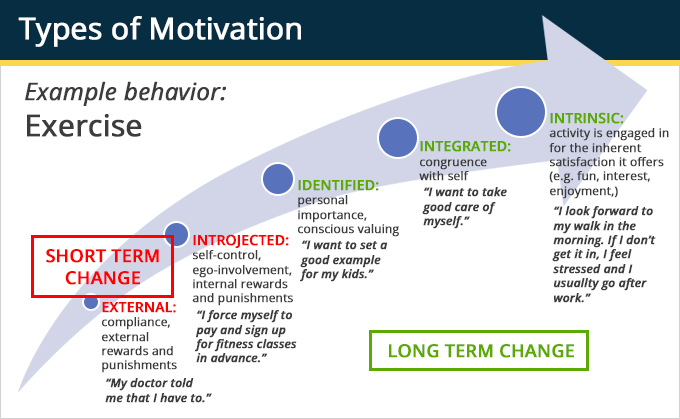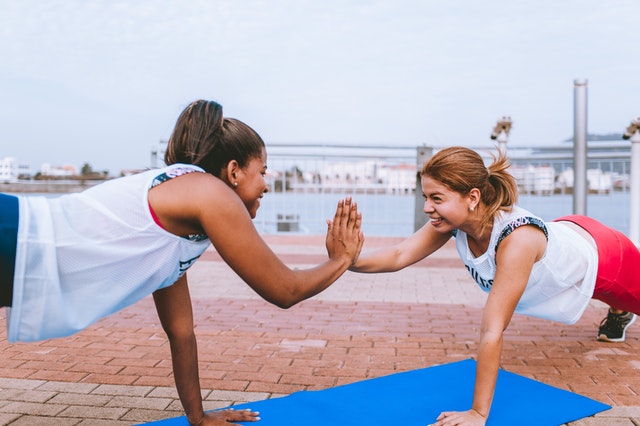Imagine for a moment the people you know who exercise regularly. Year after year, regardless of life’s stressors and circumstances, they always get back to it.
What Do These Folks Have in Common?
I’d be willing to bet that they have a strong internal drive to keep exercising.
That is, they are probably getting something out of it. It might help boost their mood, reduce stress, or give them a sense of accomplishment. Perhaps they enjoy seeing their progress, like gradually getting stronger, faster, or having more mobility and endurance.
They also probably think of exercise as a part of who they are. It’s hard to keep exercising if it isn’t integrated into your identity. They are likely to think of themselves as a fit person who sticks to their commitments. Someone who values their health and taking care of their body.
What are the Regular Exercisers not Doing?
Despite what you may think, they are probably not doing it solely to maintain their weight or to lose weight.
Most likely, they aren’t berating themselves if they miss a workout. If they are very tired on a given day, they probably adapt their exercise plans to fit that. That is, they probably have a flexible mindset, while still holding themselves to their exercise goal.
Despite this, SO many people try to exercise to lose weight. And they attempt to use the drill sergeant mentality to motivate themselves to workout.
When Being Your Own Exercise Drill Sergeant Does Not Work
Many people try to apply “discipline” to themselves in a way that comes from a place of self-criticism.
You might be thinking, but Dr. Hondorp, I NEED the discipline or I wont go.
But having structure and supports in place is different than needing discipline. The feeling that we need a drill sergeant to “keep ourselves in check” typically comes from an underlying belief that we are “out of control.” It comes from a lack of trust in our bodies, and is primarily the result of repeated dieting.
Most of us don’t like being yelled at, yet this is the approach we typically use. Whether we are obviously self-critical (e.g., calling ourselves lazy) or it’s more subtle, it’s incredibly common and also incredibly unhelpful.
We Learn Best When Feeling Safe and Supported
People learn best in environments where they feel safe and supported. So it’s not suprising that self-critcism does not work long-term.
When we beat ourselves up after missing a workout, it keeps us stuck. Versus learning what the true barrier is.
For example, perhaps you keep trying to work out at night after long days and call yourself “lazy” for not doing it.
Looking at this without the self-critical lens can help you see, “Oh hey, I’m pretty tired at that time” and try fitting in a walk in the morning or midday instead.
And we wonder why so many of us struggle to move on a regular basis.
Types of Motivation for Exercise
When it comes to motivation or willpower, the AMOUNT is less important than the TYPE.
Here is a picture of the different types of motivation ranging from external (on the left) to internal (on the right):

The research is clear, the green types, (identified, integrated, and intrinsic) are associated with long-term change (Silva et al., 2011). Yet so many people still try to force themselves into exercise using motivators from the left.
Shame-based (“I hate my body, I need to change it”) and external motivation (“I need to fit into this dress by summer”) might work for a weeks but it’s unlikely to last.
Shifting our Goals to Consider Motivation Type

Instead of only making behavioral goals (I want to exercise 4 days per week), what if we started to consider making lifestyle changes in a sustainable way? If we worked hard up front to create the right mindset, long-term change can actually be easier.
We want to avoid having to fight tooth and nail to keep up our healthy habits. It’s essential, and possible that we learn to prefer our new habits and lifestyle, regardless of what the scale says.
Our Approach to Exercise is Not Working
Let’s be real, the way we do it now clearly isn’t working for most. The number of people who meet the recommendations for aerobic and muscle-strengthening exercise is about 23% and has not improved at all despite all the knowledge about how we should be exercising (CDC, 2020).
I know you know that exercise has SO many benefits besides weight loss. It’s a shame because we often miss out on the benefits of regular exercise because weight loss overrides our internal motivation. People then stop exercising and miss out on benefits like:
- Improved concentration
- Better energy
- Stress management
- Mood improvement
- And many more
Exercise Can Be Our Essential Fuel if we Let it
Michelle Segar, PhD, MPH, wrote the book No Sweat, where she talks about this very topic. She talks about changing your mindset from viewing exercise as a chore to a gift you are giving yourself. She talks about exercise as the essential fuel that helps you engage in your life the way you want to and be the person you want to be.
If we all viewed exercise in that way, I’m pretty sure we would see the stats on regular exercisers go up substantially.
What Are Regular Exercisers Doing?: Examples of Internal “Whys”

Back to those regular exercisers, why are they keeping up the exercise?
Exercise as a Social Occasion
Some make exercise a social occasion. Whether it’s a running club, a walk with a friend, doing an exercise class (in person or a live online class), exercising with others is a great way to make it more fun. The feeling of connection can help keep us going with many positive behaviors over the long-haul.
Improve Mobility and Reduce Pain
As I’ve gotten older, one of the main reasons I keep up with exercise is to reduce or prevent pain and improve mobility. I’m more aware of this than ever, and I need to stretch, strengthen, and move regularly to keep from developing chronic back and shoulder pain.
I do my best to do exercise I enjoy, but sometimes stretching or strengthening isn’t my favorite. However, I remind myself that doing this will help me be active with my kids for years to come.
Manage Stress and Boost Your Mood
One of the most common reasons people exercise regularly is for stress management or a mood boost. Many people I know do it so they reduce stress, which helps them be more patient with their kids, kinder to the people in their lives, and more present during the day.
Better Focus or Concentration
Another great reason to exercise is to improve focus or concentration. Now that I’m working from home a majority of the days, I will sometimes do even a 10-15 minute workout to help stretch my legs but also to have the focus and concentration to finish up my work at the end of the day.
More Creativity and Problem Solving
Exercise also helps boost creativity and critical thinking skills. So many of my best ideas for new approaches to therapy or new topics to write about happen during my outside walks.
5 Tips to Increase Internal Motivation for Exercise

- Always be on the lookout for ways to make exercise more enjoyable. I know this sounds obvious, but I can’t tell you how many times people set goals for exercise based on what they think they should do versus what they actually want to do. They subscribe to the idea that they have to run on the treadmill or do an intense cycling ride and be dripping in sweat for exercise to “count” so they set that goal, even though that sounds miserable to them. Instead, look for ways to exercise and move that sound fun to you. To help you with this goal, I created a free 10 minute audio that you can listen to while you take a walk (or even while resting!) that can help shift motivation for exercise from a “should” to a “want to.” Check it out if you haven’t already!
- Look at the timing and routine that will work best. Have you heard those articles about the fact that you should workout in the morning? Yeah, me too, and they stress me out. Working out in the morning is great because you get it done and you are less likely to have things come up that get in your way, however, this isn’t right for everyone and it isn’t right for all phases of your life. Right now, working out in the morning sounds terrible to me. I want to sleep in, so I let myself. In the evening if a walk sounds better than a strength/cardio workout in my basement, I let that “count.” Being flexible in this way leads to better mood benefits from exercise and better long term adherence. And it’s the long-term adding up of your habits that really matters, not whether I can force myself to get up at 5:30am and workout for 21 days in a row.
- Find a supportive and like-minded community. We are incredibly influenced by the people around us in so many ways. If you are constantly around someone who is saying “I’m too fat, I need to exercise more” or “I need to burn off the calories from this meal” in a self-deprecating way, it will likely influence you negatively. The more we can surround ourselves with people who are exercising in a self-supportive way, the more we get inspired and find new ideas to do the same. Myself and about 20 of my friends have had a private Facebook group to provide support and accountability for exercise for about 3 years now. Most of us post several times per week about what we did along with a picture of our sweaty face. The language is always about exercise as self-care and never about hating our bodies or weight loss. We aren’t perfect and we miss days sometimes, but most of us consistently show up week after week, year after year, to the support of the group.
- Be vigilant for weight loss as a motivator. It’s ok to want to lose weight, as this may be part of your goal to feel better and move around more readily, but be on the lookout for old mindsets coming back. After you hop on the scale, do you think “what’s the point, my weight is the same.”? If your reasons for exercise are not weight-related, then the number on the scale should have no bearing whatsoever on your motivation to move. Movement will always be essential for all of us, regardless of our weight.
- If you have significant barriers to exercise right now, think creatively, or ask for help. So many people I talk to have pain or other reasons why exercise is challenging. But sometimes they have never worked with a physical therapist with specialized training, or they have never even talked to their doctor about what is going on with their pain. Sometimes finding creative ways to move is needed, and luckily with the internet there are tons of options. There is chair yoga, other exercises tailored to specific injuries, and yoga modified for different body types. If pain is persisting, talk to a trusted professional. Find out if the pain indicates that you are causing more harm. If not, perhaps you learn to reframe the pain, or pace yourself. If it is causing more harm, talk to them about what can be done to improve it. And if the professional you talk to tells you the only thing you can do is lose weight, get a second opinion. Unfortunately, weight bias is a common issue among health care professionals and the reality is that many problems can be improved even if the number on the scale does not change.
Poll: Why do you exercise?
If you exercise regularly, what keeps you going?
What reasons do you focus on most to get you to do it even if you are feeling tired?
Comment below or send me a message at info@drshawnhondorp.com!
Disclaimer/Warning: Please note, information on my site is for educational/informational purposes only and should never be used in place of medical advice. Always consult with a health care professional.
References
Centers for Disease Control. (2020). Exercise or Physical Activity Stats. Retrieved from https://www.cdc.gov/nchs/fastats/exercise.htm on May 29th, 2020.
Silva, M. N., Markland, D., Caraca, E. V. Viera, P. N…. Teixeira, P. J. (2011). Exercise autonomous motivation predicts 3-yr weight loss in women. Medicine & Science in Sport & Exercise, 728-737.
